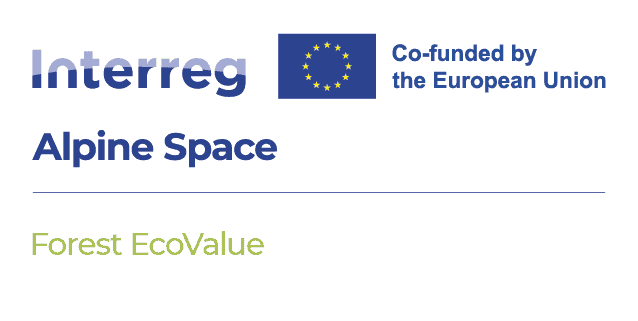
Overview
Forests of the Alpine region are facing serious threats from abandonment, climate change, and territorial degradation, that cause a decline in natural resources and in the essential services that forests provide. This, in turn, leads to high maintenance costs, making it difficult for both public and private owners to sustainably manage them.
Forest EcoValue comes to the rescue by proposing sustainable business models that focus on circular, green, and bio value chains in areas such as energy, construction, chemistry/pharmaceuticals, food, and recreation.
By bringing together the efforts of the public and private sectors, along with the participation of citizens, Forest EcoValue aims to create market frameworks and payment systems for the forest ecosystem services. Through these sustainable business models, Forest EcoValue can generate green businesses and job opportunities, thus boosting the economy in the entire region.
Factsheet
- 2021 – 2027
- Carbon neutral and resource sensitive Alpine region
- SO 2.2 - Promoting the transition to a circular and resource efficient economy
-
- AG2 Economic development
- AG6 Natural resources
- AG8 Risk governance
- 11/2022
- 10/2025
- 2.476.073 EUR
- 1.857.055 EUR
Description
The proposed solutions will be tested in a pilot action consisting of a network of 5 Living Labs in Austria, France, Germany, Italy and Slovenia.
The project will focus on a subset of ecosystem services from the following categories: provisioning (e.g. biomass, raw materials, chemicals); regulating & maintenance (e.g. biodiversity, natural risk reduction, CO2 absorption); cultural (e.g. recreation, habitat experience, health).
On the selected subset of forest ecosystem services (FES) the project will:
- Map and analyze the delivery capacity of forests
- Identify and estimate economic potential, define business models, and create market frameworks
- Test the models and tools in the Living Labs, involving local stakeholders
- Drive a consultation on the need for innovative policies to support forest maintenance, forest ecosystem services markets, and green value chains
- Provide transferable methodologies, tools, models, and policy proposals
- Implement training and capacity-building activities.
Outcomes
-
Transnational network of 5 Living Labs as testing sites for the application of D1.3.2 to set-up market frameworks and payment schemes on the selected subset of FES.Main responsible PP6 + All PPs
Apply D1.3.2 in one LL per country on selected FES. Ensure testing and support/tools to stakeholders willing to set-up a FES market. The LLs' network will address different forests’ stands and dynamic state (species, dendrometric parameters) and associated forest management (close to nature or not, by skider/cable…). Local analysis is combined with transnational collaboration, data sharing and jointly elaborated proposals for FES markets/payment schemes. One responsible PP per LL: 1 3 5 6 9 -
Transnational guidelines and tools for the establishment of public-private markets for the selected FES in alpine communities.Main responsible PP2 + PP8. All PPs strongly involved.
Through the pilot testing D 1.3.2 is revised and completed. O 2.2 consists of practical and transferable guidelines and tools applicable in different local/regional contexts for setting up the process to assess FES and establish and manage public-private payment schemes. The multi-lingual guidelines will highlight main steps and possible options, the most appropriate solutions for different contexts, the applicable methodologies and tools, as well as governance aspects. -
Regional feasibility assessment for the LL territories based on the results of the pilot experience Main Responsible PP6. All PPs strongly involved.
Analysis and synthesis from the pilot action and elaboration of a feasibility assessment for each LL territory, including recommendations for the further effective set-up and management of public and/or private payment schemes based on indigenous forest resources and their ecosystem services. O 2.3 is intended to be promoted toward local/regional policy makers and other relevant private/public decision makers who can play a crucial role in the set-up of FES markets in such territories. -
Regional Roadmaps (RRs): based on the LLs testing results they set the next steps for implementation in LLs areas. Are acknowledged by stakeholders to ensure engagement. Main resp. PP6 + LLs PPs resp.
RRs consider the results of the testing experience in each LLs. They are co-drafted with local stakeholders in a guided participative process (led by PPs responsible for LLs). RRs identify next steps for implementation and are adopted (signed) by key stakeholders at the end of the pilot, as demonstration of commitment to play a role in ensuring continuity and further steps. Target: One RR per LL signed by at least one stakeholder with a decisive role, from inside or outside the partnership. -
POLICY MEMO on improvements to enable/facilitate the development of FES markets, payment schemes and forest-based value chains in the Alpine Region.Responsible > PP4 Major support from PP2
Memorandum agreed among the involved policy makers from PPs regions/countries and beyond, with conclusions on policy actions and regulatory adaptation for the set-up of FES market in the Alpine region. It results from the inputs collected in the policy fora and the policy dialogue process that will also involve representative from Target groups 14, 18, 19. It takes advantage of needs detected in WP1, WP2 and pilot action. Aimed to Alpine Region policy makers (target groups 1, 2, 3, 4). -
Online Training ModulesMain responsible PP7. Support from PP8.
The content elaborated for the Summer Schools (D 3.2.2) will be made available to the wider audience by publishing the training modules on the project website. They will provide clarifications and examples for the application off the proposed methodologies, tools and business models (O 2.2) as well as indications on policy/governance barriers and enabling factors. Addressed to TG 4, 5, 6, 8, 10, 11, 14, 16
Pilots
-
LIVING LAB

